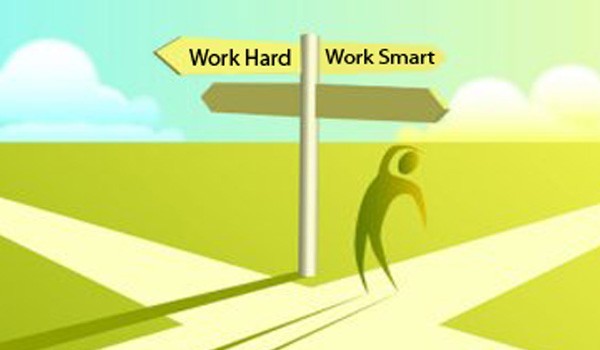Why Hard Work, Do Smart Work
We’re often told that hard work gets us ahead. That’s true to an extent – if you put effort and focus into something, you’re going to achieve more than if you go at it in a half-hearted way. But it’s all too easy to get sucked into working long hours, ticking tasks off a list, without being all that effective or successful.

Instead of just working hard – putting in lots of hours – look for ways to work smart.
Why?
Because smart work means you’re more likely to reach your goals. Sadly, it’s all too possible to work hard without any recognition and without achieving success. Sure, you might be up to date with all your emails … but that might not bring you any nearer to winning a promotion, or to starting your own business.

Plus, when we’re working hard, other areas of our life get neglected. Maybe you’re working long hours but eating poorly and never exercising. It might not seem like such a bad choice now, but when you run into health problems a few years down the road, you’re going to wish you’d found a better balance.

Working too hard can have a really negative effect on your quality of life, too. Long hours and the pressure to keep doing more can lead to stress, burn out, depression, or just that miserable feeling of is this all there is to life?

So how can you get away from the mindset of working hard and start working smart?
1. Get Help
Yes, you might want to get to the top and say “I did it all myself.” The truth is, to succeed, you need to let other people help you. Read the acknowledgements in any bestselling book, and you’ll see the author giving credit to a whole host of supporters – editors, agents, friends, family.
Help can come in all sorts of forms. It might be emotional support. It might be someone taking care of the cooking or the housework so that you can focus on work. It could have a direct relation to your work – either by delegating tasks which don’t use your skills to the full, or by getting advice on an area which you’re struggling with on your own.
2. Rest More
I’m always a bit iffy about stories of people functioning on three hours sleep while they build their business empire. Sure, they might achieve something great – but I always wonder if they’d have done even better with a full night’s rest.
If you’re doing anything remotely creative or which requires concentration, you’re not going to be at anywhere near 100% if you’re not resting enough. That doesn’t just mean getting a good night’s sleep – it also means taking time off to relax and play. This isn’t “wasting” time – it’s ensuring that you can be on top form during your working hours.
3. First Things First
“First Things First” is one of Stephen Covey’s “7 Habits” in 7 Habits of Highly Effective People. It means taking care of the most important things in your life before turning to the rest.
If you tend to prioritize by urgency – dealing with whatever comes in by email or by phone – then find a way to structure your day so that your important work gets done first. It’s amazing how much you can accomplish in a single focused hour at the start of the workday, when you’re feeling fresh and motivated.
4. Limit Your Goals
Of course, if you’re going to put first things first, that means knowing what’s really important. Chasing multiple goals at once isn’t usually a good strategy. You might be able to manage it if your goals support one another (e.g. “eat more healthily” might give you the energy for “launch my business”), but having lots of goals generally diffuses your attention.
Rather than trying to do everything at once, pick one or two key goals for each year, and focus wholeheartedly on those. It’s much better to actually accomplish a dream than to have a vague stab at lots of different things … only to end up making very little progress.





 CAclubindia
CAclubindia
